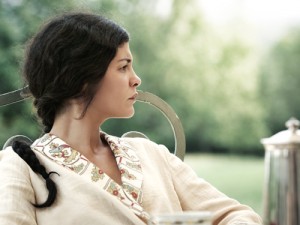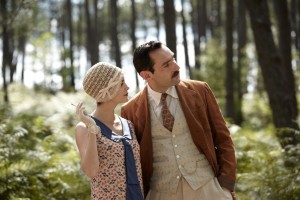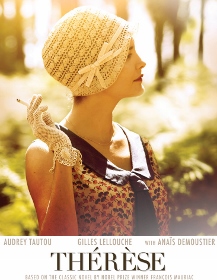WHEN BANAL IS SAID AND DONE
Claude Miller’s final film Thérèse, based on François Mauriac’s novel Thérèse Desqueyroux, is a masterfully directed, superbly acted, richly photographed and beautifully designed costume drama that thoughtfully illustrates profound aspects of the human condition, and feels as dull and familiar as so many other French or British period pieces based on serious literature. Audrey Tautou delivers a delicate  performance as Thérèse, a young woman from a well-to-do provincial family, who marries Bernard Desqueyroux (the excellent Gilles Lellouche), a wealthy, boorish landowner. She does this in order to, as she puts it, quiet her thoughts; Thérèse has many thoughts, too many for the provincial society in which she lives. But her problems seem to go deeper than lack of emancipation or conflicts with the social conventions which dominate the French countryside of the 1920s. Her angst feels existential. Thérèse seems to have no place for herself; nothing fits her and she does not fit into anything. She wants something but she does not know what. She does know however that she does not want the life that she has, and her attempts to extricate herself from it lead to perilous consequences.
performance as Thérèse, a young woman from a well-to-do provincial family, who marries Bernard Desqueyroux (the excellent Gilles Lellouche), a wealthy, boorish landowner. She does this in order to, as she puts it, quiet her thoughts; Thérèse has many thoughts, too many for the provincial society in which she lives. But her problems seem to go deeper than lack of emancipation or conflicts with the social conventions which dominate the French countryside of the 1920s. Her angst feels existential. Thérèse seems to have no place for herself; nothing fits her and she does not fit into anything. She wants something but she does not know what. She does know however that she does not want the life that she has, and her attempts to extricate herself from it lead to perilous consequences.
These consequences take place over an hour into the movie, at which point not only does the film finally become more or less compelling, but I found myself at last sympathizing with the heroine who, up until then, was not much more than a mildly unpleasant, if enigmatic, presence. A character must be doing something for us to be interested in her. And if her corresponding literary personage perhaps does not  physically do all that much, then maybe her inner life needs to be made somehow cinematic and visual – sitting there looking mysterious and somber in beautiful surroundings will only get you so far. In his film Mr. Miller seems to be showing us only the essentials necessary to tell the main story – the lush scenery is merely a backdrop and lacks the weight of a “character.” But it seems that a lot more could have been said during the 110 minute runtime. We need to see life – humor, irony, poetry – something to keep us engaged until the artist makes his one big point at the end. It’s those elements, those details, that make a film like, say, Gosford Park quietly compelling throughout, and differentiate it from the countless other well-made but stifling period dramas.
physically do all that much, then maybe her inner life needs to be made somehow cinematic and visual – sitting there looking mysterious and somber in beautiful surroundings will only get you so far. In his film Mr. Miller seems to be showing us only the essentials necessary to tell the main story – the lush scenery is merely a backdrop and lacks the weight of a “character.” But it seems that a lot more could have been said during the 110 minute runtime. We need to see life – humor, irony, poetry – something to keep us engaged until the artist makes his one big point at the end. It’s those elements, those details, that make a film like, say, Gosford Park quietly compelling throughout, and differentiate it from the countless other well-made but stifling period dramas.
photos courtesy of MPI Pictures
Thérèse
MPI Pictures
France / 2012 / 110 minutes / not rated
in limited release August 23, 2013

